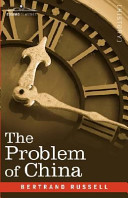
Books, Brochures, and Chapters>Book: Russell , Bertrand (2007-12-01), The Problem of China, Cosimo, Inc., Retrieved on 2013-10-11Source Material [books.google.com]
Folksonomies: history Memes
11 OCT 2013
 Confucianism Produced a Civil China
Confucianism Produced a Civil China
I must confess that I am unable to appreciate the merits of Confucius. His writings are largely occupied with trivial points of etiquette, and his main concern is to teach people how to behave correctly on various occasions. When one compares him, however, with the traditional religious teachers of some other ages and races, one must admit that he has great merits, even if they are mainly negative. His system, as developed by his followers, is one of pure ethics, without religious dogma; it h...The Europeans think the Chinese weak because of their quiet dignity, but Bertrand Russel sees it as a strength with which they conquer.
11 OCT 2013
 How China and the West May Compliment One Another
How China and the West May Compliment One Another
The distinctive merit of our civilization, I should say, is the scientific method; the distinctive merit of the Chinese is a just conception of the ends of life. It is these two that one must hope to see gradually uniting.
Lao-Tze describes the operation of Tao as "production without possession, action without self-assertion, development without domination." I think one could derive from these words a conception of the ends of life as reflective Chinese see them, and it must be admitted that...The West has science, which is the essence of rationality, while China has the ethics, an outlook on life that cherishes knowledge and happiness over material gains.
11 OCT 2013
 Confucianism's Lack of "Magic" Made it Endure
Confucianism's Lack of "Magic" Made it Endure
Confucius (B.C. 551-479) must be reckoned, as regards his social influence, with the founders of religions. His effect on institutions and on men's thoughts has been of the same kind of magnitude as that of Buddha, Christ, or Mahomet, but curiously different in its nature. Unlike Buddha and Christ, he is a completely historical character, about whose life a great deal is known, and with whom legend and myth have been less busy than with most men of his kind. What most distinguishes him from o...It was a code of morals by human beings for human beings, with no supernatural elements to make them unrealistic. As a result, it made life in China more pleasant for thousands of years.
11 OCT 2013
 The Power of the Chinese Ideogram
The Power of the Chinese Ideogram
As everyone knows, the Chinese do not have letters, as we do, but symbols for whole words. This has, of course, many inconveniences: it means that, in learning to write, there are an immense number of different signs to be learnt, not only 26 as with us; that there is no such thing as alphabetical order, so that dictionaries, files, catalogues, etc., are difficult to arrange and linotype is impossible; that foreign words, such as proper names and scientific terms, cannot be written down by so...Phonetic alphabets change over time as the sounds of the language drift, by decoupling the sounds of the language from the alphabet, the Chinese have produced a written language that can survive thousands of years.




